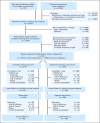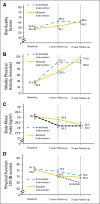Reach out to enhance wellness home-based diet-exercise intervention promotes reproducible and sustainable long-term improvements in health behaviors, body weight, and physical functioning in older, overweight/obese cancer survivors
- PMID: 22614994
- PMCID: PMC3675693
- DOI: 10.1200/JCO.2011.40.0895
Reach out to enhance wellness home-based diet-exercise intervention promotes reproducible and sustainable long-term improvements in health behaviors, body weight, and physical functioning in older, overweight/obese cancer survivors
Abstract
Purpose: Diet and exercise interventions have been tested in cancer survivors as a means to reduce late effects and comorbidity, but few have assessed adherence and health outcomes long term.
Methods: Between July 2005 and May 2007, the Reach Out to Enhance Wellness (RENEW) trial accrued 641 locoregionally staged, long-term (≥ 5 years from diagnosis) colorectal, breast, and prostate cancer survivors in the United States (21 states), Canada, and the United Kingdom. All participants were sedentary (< 150 minutes of physical activity [PA] a week), overweight or obese (body mass index, 25 to 40 kg/m(2)), and over age 65 years. The trial tested a diet-exercise intervention delivered via mailed print materials and telephone counseling. RENEW used a wait-list control, cross-over design (ie, participants received the year-long intervention immediately or after a 1-year delay), which allowed the opportunity to assess program efficacy (previously reported primary outcome), durability, and reproducibility (reported herein). Measures included diet quality (DQ), PA, BMI, and physical function (PF).
Results: No significant relapse was observed in the immediate-intervention arm for DQ, PA, and BMI; however, rates of functional decline increased when the intervention ceased. From year 1 to year 2, significant improvements were observed in the delayed-intervention arm; mean change scores in behaviors and BMI and PF slopes were as follows: DQ score, 5.2 (95% CI, 3.4 to 7.0); PA, 45.8 min/wk (95% CI, 26.9 to 64.6 min/wk); BMI, -0.56 (95% CI, -0.75 to -0.36); and Short Form-36 PF, -1.02 versus -5.52 (P < .001 for all measures). Overall, both arms experienced significant improvements in DQ, PA, and BMI from baseline to 2-year follow-up (P < .001).
Conclusion: Older cancer survivors respond favorably to lifestyle interventions and make durable changes in DQ and PA that contribute to sustained weight loss. These changes positively reorient functional decline trajectories during intervention delivery.
Conflict of interest statement
Authors' disclosures of potential conflicts of interest and author contributions are found at the end of this article.
Figures


Comment in
-
NEW and RENEW: building the case for weight loss in breast cancer.J Clin Oncol. 2012 Jul 1;30(19):2294-6. doi: 10.1200/JCO.2012.42.5496. Epub 2012 May 21. J Clin Oncol. 2012. PMID: 22614991 No abstract available.
References
-
- Carver JR, Shapiro CL, Ng A, et al. American Society of Clinical Oncology clinical evidence review on the ongoing care of adult cancer survivors: Cardiac and pulmonary late effects. J Clin Oncol. 2007;25:3991–4008. - PubMed
-
- Ganz PA. Survivorship: Adult cancer survivors. Prim Care. 2009;36:721–741. - PubMed
-
- Hewitt M, Ganz PA. From Cancer Patient to Cancer Survivor: Lost in Transition. Washington, DC: National Academies Press; 2005.
-
- Doyle C, Kushi LH, Byers T, et al. Nutrition and physical activity during and after cancer treatment: An American Cancer Society guide for informed choices. CA Cancer J Clin. 2006;56:323–353. - PubMed
Publication types
MeSH terms
Grants and funding
LinkOut - more resources
Full Text Sources
Other Literature Sources
Medical

